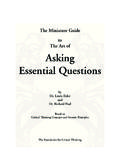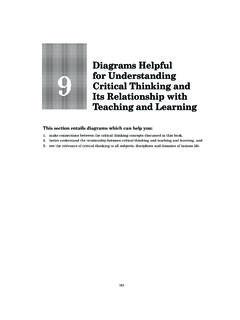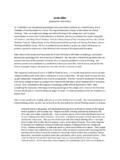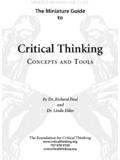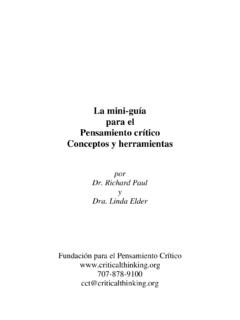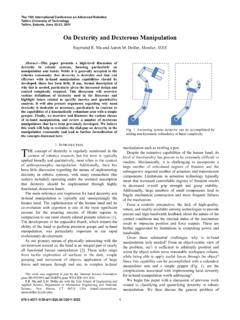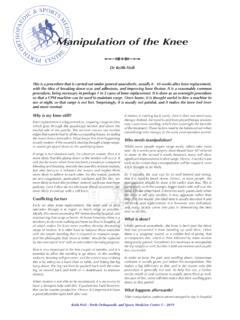Transcription of The Thinker’s Guide To Fallacies
1 The Thinker s GuideToFallacies:The Art of Mental Trickeryand ManipulationBy Dr. Richard Paul and Dr. Linda ElderThe Foundation for Critical Thinking The Thinker s Guide to Fallacies : The Art of Mental Trickery and manipulation 2004 Foundation for Critical understand the human mind, understand word fallacy derives from two Latin words, fallax ( deceptive ) andfallere ( to deceive ). This is an important concept in human life becausemuch human thinking deceives itself while deceiving others. The humanmind has no natural Guide to the truth, nor does it naturally love thetruth. What the human mind loves is itself, what serves it, what flattersit, what gives it what it wants, and what strikes down and destroyswhatever threatens study of Fallacies can be pursued in at least two different ways. It can be approached traditionally: in which case one defines, explains, andexemplifies ways in which unsound arguments can be made to appearsound. Or it can be approached deeply, in which case one relates theconstruction of Fallacies to the pursuit of human interests and irrationaldesires.
2 Using the first approach, students gain little by memorizing thenames and definitions of Fallacies . They soon forget them. Their mindsare left largely untouched and therefore unmoved. On the other hand,the second approach makes possible the acquisition of lifelong insightsinto how the mind every mind uses unsound arguments andintellectual tricks to further its we look closely at human decisions and human behavior, we caneasily see that what counts in human life is not who is right, but who iswinning. Those who possess power in the form of wealth, property, andweaponry are those who decide what truths will be trumpeted aroundthe world and what truths will be ridiculed, silenced, or suppressed. Themass media of the world generate an unending glut of messages thatcontinually sacrifice truth to spin. When we reach beneath the surfaceof things, we find a world in which the word communication and theword manipulation collapse into virtual need seminal insights and intellectual tools that enable them toprotect themselves from becoming intellectual victims in a world ofswarming media piranhas, or, just as bad, from joining the swarm as ajunior piranha in training.
3 Insights and tools, grounded in intellectualintegrity, should be the ultimate aim of the study of Fallacies . Theyhave been our aim in this PaulLinda ElderCenter for Critical ThinkingFoundation for Critical Thinking 2004 Foundation for Critical Thinker s Guide to Fallacies : The Art of Mental Trickery and ManipulationContentsFirst Edition 2004 Foundation for Critical and Deception in the Human Mind ..3 Uncritical Persons (intellectually unskilled thinkers) ..3 4 Skilled Manipulators (weak-sense critical thinkers) ..4 5 Fair-Minded Critical Persons (strong-sense critical thinkers) ..5 6 The Concept of Fallacies of 7 Naming Fallacies ..7 8 Mistakes Versus Fallacies ..8 There is No Exhaustive List of Fallacies ..9 10 Faulty Generalizations ..10 12 Analyzing Generalizations ..13 15 Post Hoc Generalizations ..16 Analogies and Metaphors ..16 1844 Foul Ways to Win an Argument ..19 38 Accuse Your Opponent of Doing What He is Accusing You ofor Him of Sliding Down A Slippery Slope (that leads to disaster).
4 20 Appeal to 21 Appeal to to to Pity (or sympathy)..21 22 Appeal to Popular Passions ..22 Appeal to Tradition or Faith ( the tried and true ) ..22 23 Assume a Posture of Righteousness ..23 Attack the person (and not the argument) ..23 Beg the Question ..24 Call For Perfection (Demand impossible conditions)..24 Create a False Dilemma (the Great Either/Or) ..25 Devise Analogies (and Metaphors) That Support Your View (even if they are misleading or false ) ..25 Question Your Opponent s Conclusions ..26 Create Misgivings: Where There s Smoke, There s Fire ..26 27 Create A Straw 28 Deny or Defend Your Inconsistencies ..28 Demonize His Side Sanitize Yours ..28 29 The Thinker s Guide to Fallacies : The Art of Mental Trickery and manipulation 2004 Foundation for Critical Questions, Your What You Say ..29 Ignore the Evidence ..30 Ignore the Main Point ..30 Attack Evidence (That Undermines Your Case)..30 Insist Loudly on a Minor Point ..30 31 Use the Hard-Cruel-World Argument (to justify doing what is usually considered unethical).
5 31 Make (Sweeping) Glittering Much of Any Inconsistencies in Your Opponent s Position ..32 Make Your Opponent Look Ridiculous ( Lost in the Laugh )..32 Oversimplify the Nothing But Objections ..32 Rewrite History (Have It Your Way) ..33 Seek Your Vested Interests ..33 Shift the Ground ..33 Shift the Burden of Proof ..33 34 Spin, Spin, in Vague Generalities..34 35 Talk Double Big Lies ..36 Treat Abstract Words and Symbols As If They Were Real Things ..36 Throw In A Red Herring (or two)..37 Throw in Some Double Standards (whenever you can) ..3744 Foul Ways to Win an Argument (Chart) ..38 Fallacy Detection: Analyzing a Speech from the Past ..39 44 Fallacy Detection: Analyzing a Current Presidential Speech ..45 50 Fallacy Detection: Analyzing a Speech from a Presidential Candidate ..50 53 Avoid Two Extremes: ..53 541) Finding Fallacies Only in the Thinking of Others (None in Yourself), and2) Finding an Equal Number of Fallacies in Everything you : Fallacies in An Ideal (And in a Real) World.
6 54 55 2004 Foundation for Critical Thinker s Guide to Fallacies : The Art of Mental Trickery and Manipulation3 Truth and Deception in the Human MindThe human mind is a marvelous set of structures and systems. It is a centerof consciousness and action. It forms a unique identity. It creates a view ofthe world. Rich experience emerges from its interactions with the world. Itthinks. It feels. It wants. It apprehends truths and suppresses errors. Itachieves insights and fabricates prejudices. Both useful truths and harmfulmisconceptions are its intermixed products. It can as easily believe what isfalse as what is true. It can see beauty in right conduct and justify what is flagrantly unethical. Itcan love and hate. It can be kind and cruel. It can advance knowledge orerror. It can be intellectually humble or intellectually arrogant. It can beempathic or narrow-minded. It can be open or closed. It can achieve apermanent state of expanding knowledge or a deadening state ofnarrowing ignorance.
7 It both transcends the creatures of lessor ability andinsults their innocence and nobility by its self-deception and can humans create within their own minds such an inconsistentamalgam of the rational and the irrational? The answer is self-deception. Infact, perhaps the most accurate and useful definition of humans is that of the self-deceiving animal. Deception, duplicity, sophistry, delusion, andhypocrisy are foundational products of human nature in its natural, untutored state. Rather than reducing these tendencies, most schooling andsocial influences redirect them, rendering them more sophisticated, moreartful, and more obscure. To exacerbate this problem, not only are humans instinctively self-deceptive, they are naturally sociocentric as well. Every culture and societysees itself as special and as justified in all of its basic beliefs and practices, inall its values and taboos. The arbitrary nature of its folkways is known to itsanthropologists (if it has any), but not to its overwhelming Persons (intellectually unskilled thinkers)The over-whelming preponderance of people have not freely decided whatto believe, but, rather, have been socially conditioned (indoctrinated) intotheir beliefs.
8 They are unreflective thinkers. Their minds are products ofsocial and personal forces they neither understand, control, nor concernthemselves with. Their personal beliefs are often based in prejudices. Theirthinking is largely comprised of stereotypes, caricatures, oversimplifications,sweeping generalizations, illusions, delusions, rationalizations, falsedilemmas, and begged questions. Their motivations are often traceable toirrational fears and attachments, personal vanity and envy, intellectualarrogance and simple-mindedness. These constructs have become a part oftheir identity. Such persons are focused on what immediately affects them. They see theThe Thinker s Guide to Fallacies : The Art of Mental Trickery and manipulation 2004 Foundation for Critical through ethnocentric and nationalistic eyes. They stereotype peoplefrom other cultures. When their beliefs are questioned howeverunjustified those beliefs may be they feel personally attacked. Whenthey feel threatened, they typically revert to infantile thinking andemotional counter attacks.
9 When theirprejudices are questioned, they often feel offended andstereotype the questioner as intolerant and prejudiced. They rely onsweeping generalizations to support their beliefs. They resent being corrected, disagreed with, or criticized. They want to be re-enforced,flattered, and made to feel important. They want to be presented with asimple-minded, black-and-white, world. They have little or nounderstanding of nuances, fine distinctions, or subtle points. They want to be told who is evil and who is good. They see themselves as good. They see their enemies as evil. They want all problems to admitto a simple solution and the solution to be one they are familiar with forexample, punishing those who are evil by use of force and violence. Visualimages are much more powerful in their minds than abstract are overly impressed by authority, power, and celebrity. They areeminently ready to be directed and controlled, as long as those doing thecontrolling flatter them and lead them to believe that their views arecorrect and insightful.
10 The mass media are structured to appeal to such persons. Subtle andcomplex issues are reduced to simplistic formulas ( Get tough on crime!Three strikes and you re out! Adult crime, adult time! You are either for usor against us! ) Spin is everything; substance is Manipulators (weak-sense critical thinkers)There is a much smaller group of people who are skilled in the art ofmanipulation and control. These people are shrewdly focused on pursuingtheir own interest without respect to how that pursuit affects they share many of the characteristics of uncritical thinkers, theyhave qualities that separate them from uncritical persons. They havegreater command of the rhetoric of persuasion. They are moresophisticated, more verbal, and generally have greater status. On average,they have more schooling and achieve more success than uncritical typically acquire more power and occupy positions of authority. Theyare accustomed to playing the dominant role in relationships. They knowhow to use the established structure of power to advance their they are fundamentally concerned, not with advancing rationalvalues, but with getting what they want, they are careful to presentthemselves as sharing the values of those they manipulators are rarely insightful dissenters, rebels, or critics ofsociety.
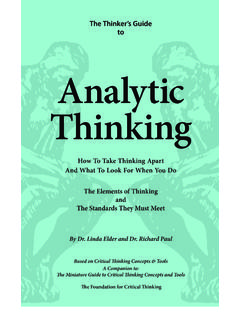
![riChard Paul [ ] - Critical thinking](/cache/preview/4/4/e/4/c/a/a/a/thumb-44e4caaa8aace41cbe216a7e608396cc.jpg)


